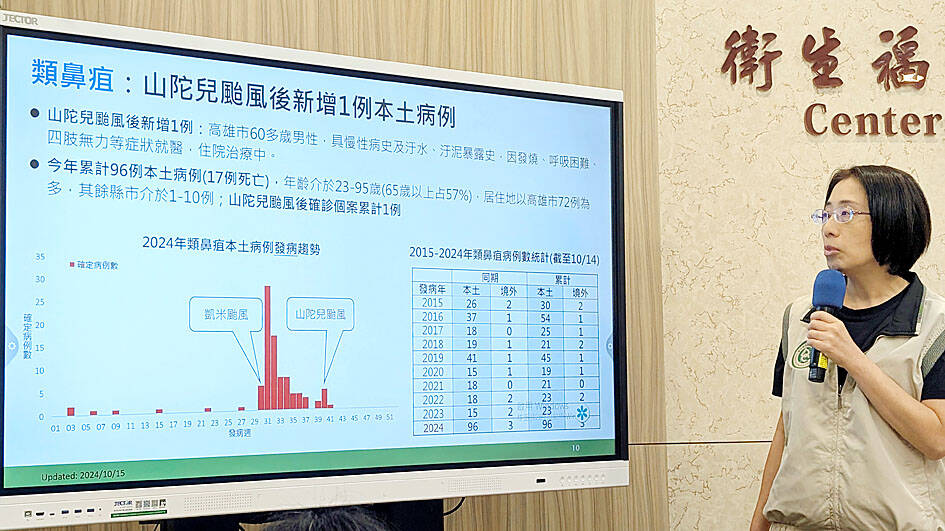The Centers for Disease Control (CDC) yesterday reported the first case of melioidosis since Typhoon Krathon struck Taiwan earlier this month and predicted that enterovirus outbreaks would continue for a month, falling below the epidemic threshold in the middle of next month.
A man in his 60s in Kaohsiung was diagnosed with melioidosis, CDC Epidemic Intelligence Center Deputy Director Lee Chia-lin (李佳琳) said.
There have been 96 local cases of melioidosis this year, including 17 deaths, the most cases in the period in 14 years, Lee said.

Photo: CNA
CDC physician Lin Yung-ching (林詠青) said that the man had chronic hypertension and asthma, and developed a fever early this month.
The man sought medical treatment two days later for a sustained fever, difficulty breathing and limb weakness, Lin said.
Tests at a hospital emergency department showed that the patient had low blood pressure and blood oxygen levels, Lin said, adding that the man was diagnosed with pneumonia and septic shock, and hospitalized.
The man told medical personnel that there was flooding near his home during the storm, but he did not wear protective clothing while in the floodwater, nor did he wear a mask while outside, Lin said.
The bacteria that cause melioidosis are found in soil and water, and people with open wounds can get infected through direct exposure to contaminated floodwater and mud, or by inhaling contaminated dust or water droplets, Lin said, adding that person-to-person transmission is rare.
People with diabetes, liver or kidney diseases, as well as immunocompromised people, have increased risks of infection, so they are advised to wear protective clothing when cleaning up after a flood, keep windows closed and wear a mask when outside in typhoon-affected areas, he said.
The incubation period ranges from a few hours to 21 days or longer, so people with suspected symptoms within a month after a typhoon are advised to tell a doctor if they were exposed to floodwater or mud, he added.
CDC Deputy Director-General Philip Lo (羅一鈞) said there were 69 confirmed cases of melioidosis after Typhoon Gaemi swept over Taiwan in late July.
As the flooding from Typhoon Krathon was not as serious, the centers expect the melioidosis outbreak to be less severe, but people should be aware of melioidosis symptoms in the month after a typhoon, Lo said.
There were 15,666 hospital visits for enterovirus infection last week, down about 10 percent from the previous week, with the main circulating strains being coxsackievirus A16 and coxsackievirus A10, Lee said.
Weekly hospital visits have dropped for two consecutive weeks, but the CDC predicts that the number would drop below the epidemic threshold in the middle of next month, Lo said, adding that at least 262 classes — including 197 preschool classes — were suspended due to enterovirus infections late last month.
The CDC reported a new case of local dengue fever in New Taipei City that was associated with a cluster of infections in the city.
People who are eligible for COVID-19 and government-funded flu vaccines should get vaccinated as soon as possible for better protection, as temperatures are expected to fall with the arrival of the northeast monsoon, and sudden temperature changes increase the risk of developing respiratory infections, it said.

An essay competition jointly organized by a local writing society and a publisher affiliated with the Chinese Communist Party (CCP) might have contravened the Act Governing Relations Between the People of the Taiwan Area and the Mainland Area (臺灣地區與大陸地區人民關係條例), the Mainland Affairs Council (MAC) said on Thursday. “In this case, the partner organization is clearly an agency under the CCP’s Fujian Provincial Committee,” MAC Deputy Minister and spokesperson Liang Wen-chieh (梁文傑) said at a news briefing in Taipei. “It also involves bringing Taiwanese students to China with all-expenses-paid arrangements to attend award ceremonies and camps,” Liang said. Those two “characteristics” are typically sufficient

A magnitude 5.9 earthquake that struck about 33km off the coast of Hualien City was the "main shock" in a series of quakes in the area, with aftershocks expected over the next three days, the Central Weather Administration (CWA) said yesterday. Prior to the magnitude 5.9 quake shaking most of Taiwan at 6:53pm yesterday, six other earthquakes stronger than a magnitude of 4, starting with a magnitude 5.5 quake at 6:09pm, occurred in the area. CWA Seismological Center Director Wu Chien-fu (吳健富) confirmed that the quakes were all part of the same series and that the magnitude 5.5 temblor was

The brilliant blue waters, thick foliage and bucolic atmosphere on this seemingly idyllic archipelago deep in the Pacific Ocean belie the key role it now plays in a titanic geopolitical struggle. Palau is again on the front line as China, and the US and its allies prepare their forces in an intensifying contest for control over the Asia-Pacific region. The democratic nation of just 17,000 people hosts US-controlled airstrips and soon-to-be-completed radar installations that the US military describes as “critical” to monitoring vast swathes of water and airspace. It is also a key piece of the second island chain, a string of

The Central Weather Administration has issued a heat alert for southeastern Taiwan, warning of temperatures as high as 36°C today, while alerting some coastal areas of strong winds later in the day. Kaohsiung’s Neimen District (內門) and Pingtung County’s Neipu Township (內埔) are under an orange heat alert, which warns of temperatures as high as 36°C for three consecutive days, the CWA said, citing southwest winds. The heat would also extend to Tainan’s Nansi (楠西) and Yujing (玉井) districts, as well as Pingtung’s Gaoshu (高樹), Yanpu (鹽埔) and Majia (瑪家) townships, it said, forecasting highs of up to 36°C in those areas